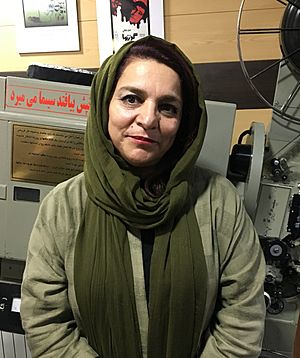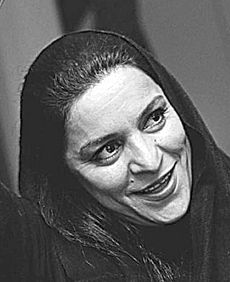Tahmineh Milani facts for kids
Quick facts for kids
Tahmineh Milāni
|
|
|---|---|
| تهمینه میلانی | |

Tehmineh Milani in 2017
|
|
| Born | 6 September 1960 Tabriz, Iran
|
| Occupation | Film director, producer, screenwriter, architect |
| Years active | 1980–present |
| Spouse(s) | Mohammad Nikbin |
| Relatives | Ahmad Milani (father) |
Tahmineh Milāni (Persian: تهمینه میلانی; born in 1960) is a famous Iranian film director and producer. She is known for making movies that often talk about important social issues, especially women's rights and challenges faced by women in society.
Contents
Starting Her Journey
Tahmineh Milāni was born in 1960 in Tabriz, Iran. She first studied architecture at the University of Science and Technology in Tehran. After finishing her studies in 1986, she started working in films. She learned by being a script girl and an assistant director, which helped her understand how movies are made.
Directing Movies
Tahmineh Milāni has directed many films that have won awards. Some of her well-known movies include Two Women, The Fifth Reaction, and The Unwanted Woman. Her films often explore cultural and social topics, focusing on the lives of women and the changes in Iran since the 1979 Iranian Revolution. She believes that many people in Iran feel they cannot truly express themselves.
Her early films were like fables, which are stories that teach a lesson. For example, in her 1990 film The Legend of a Sigh, a writer who feels like a failure learns from her own sigh of despair. The sigh shows her other women who have bigger problems but still find happiness. Two years later, in What Did You Do Again?, she told the story of a young girl who could change her family just by talking to herself. Some people in Iran did not like these films because they thought Tahmineh was encouraging women to challenge old ways. But she explained that she was just showing real-life situations.
Later, Tahmineh Milāni's films became more dramatic. She focused even more on gender issues and how women sometimes face unfair treatment and difficulties in society.
Her 2001 film The Hidden Half told the story of a university student who was against the government of Shah Mohammad Rezā Shāh Pahlavi. Because of the film's story, Tahmineh Milāni faced difficulties. However, many famous directors from around the world, like Francis Ford Coppola and Martin Scorsese, supported her.
In 2005, Milāni directed The Unwanted Woman. This movie is about a woman who has to hide a trip with a friend because of a rule that makes it hard for unmarried couples to travel. Her 2003 film The Fifth Reaction is about a woman who leaves her wealth and home after her husband dies. This film, like many of her others, highlights issues like sexism and social inequality. It also brings attention to laws that do not always protect women's rights, especially in cases of child custody. Tahmineh Milāni hopes her films inspire women to stand up for their rights.
In 2007, she announced plans to create a TV series about AIDS called The Positive Pals Club. Her film One of Our Two was shown in Iranian cinemas in 2011. She also wrote and directed a film called Principles.
In 2016, Tahmineh Milāni had an exhibition of her photographs in Tehran.
Art Exhibitions and Discussions
In 2018, Tahmineh Milāni had an exhibition of her paintings. Some people on social media said that some of her paintings looked very similar to works by other artists. Tahmineh Milāni apologized, saying that an image she had seen before might have stayed in her mind and influenced her painting without her realizing it. She said that any money made from the exhibition would go to charity.
In 2019, during another exhibition of her paintings, similar discussions about her art arose. Tahmineh Milāni stated on her Instagram that she gets inspiration from many different things and people.
Personal Life
Tahmineh Milāni is married to Mohammad Nikbin, who is an Iranian actor and producer.
Filmography
| Year | Title | Role | Notes |
|---|---|---|---|
| 2018 | Untaken Paths | Director | |
| 2011 | One of Our Two | Director | |
| 2008 | Superstar | Director | |
| 2007 | Settling Scores | Director | |
| 2006 | Cease Fire | Director | |
| 2005 | The Unwanted Woman | Director | |
| 2003 | The Fifth Reaction | Director | |
| 2001 | The Hidden Half | Director | |
| 1999 | Two Women | Director | |
| 1996 | Kākādu | Director | |
| 1992 | What Else Is New? | Director | |
| 1991 | The Legend of Sigh | Director | |
| 1989 | Children of Divorce | Director |
Awards and Recognition
| Year | Award | Category | Work | Result | Notes |
|---|---|---|---|---|---|
| 2006 | Asia Pacific Film Festival | Best Screenplay | The Unwanted Woman | Won | |
| Best Film | Won | ||||
| Best Director | Won | ||||
| 2005 | Los Angeles Film Festival | Best Film | Won | ||
| 2003 | Geneva Cinéma Tout Ecran | Grand Prix 'Cinéma Tout Ecran' | The Fifth Reaction | Won | |
| 2003 | Cairo International Film Festival | Best Screenplay | Won | ||
| 2001 | Cairo International Film Festival | Best Artistic Contribution | The Hidden Half | Won | |
| 1999 | Iran's Fajr International Film Festival | Best Screenplay | Two Women | Won |
Learn More
- Iranian women's movement
- Iranian women
- Iranian cinema
 | Jackie Robinson |
 | Jack Johnson |
 | Althea Gibson |
 | Arthur Ashe |
 | Muhammad Ali |


